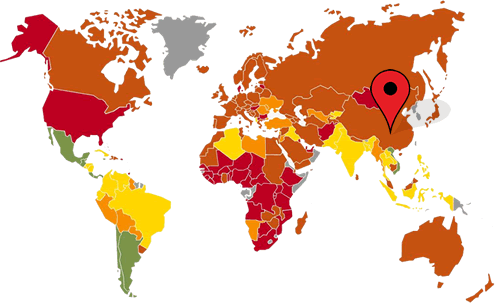Teaching English in Wenzhou, China
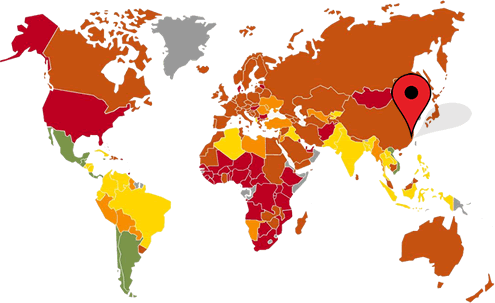
Report submitted on 19 August, 2014 by Christina Goodno.
Teaching English in Wenzhou, China:
How can teachers find teaching jobs in Wenzhou, China?
There are many ESL teaching job sites on the internet. It’s a good idea for those starting their first year to work at a well known and large training center such as English First or Kids Castle. Your pay checks are automatically deposited into a Chinese bank account each month and they have corporate rules thus increasing your chance of a good / acceptable first experience.
The main English teaching jobs available are:
Full time English language school positions, part time English language school positions, teaching at kindergartens / pre-schools, teaching at state schools, private teaching (not through a school, agency, etc.).
In September, University positions are filled. Training centers always have openings. Larger cities in coastal cities often require 2 years of teaching experience for adults to obtain your Foreigner Expert Certificate (required to work and keep / get your work visa). Thus, your first two years will likely be in the interior of China or at a training center. There are many kindergarten positions. Private international schools generally want a teacher with a teaching certificate from their home country (not ESL certificate) and at least two years of experience. They are more selective. Private tutoring is widely available as you talk to people around you. Many will ask if you can. The key is to be prepared to do it and most often is done secretly (many training centers forbid private tutoring as they do not want you to steal their clients). Get your materials together! This website is fantastic for making that happen! Buy a laminator, printer, basic school supplies, shelving unit, etc., and you are up and running in no time at all. Meet them at their home or yours (it is probably best to meet them at their home so quickly learn the bus system and how to get around town).
What are the minimum teaching requirements?
Bachelors degree, 100-120 hour ESL teaching certificate, no experience necessary to start at most training centers, native English speaker thus you will need a passport showing your country of birth to be the US, Canada, UK, Australia and … mmm … I’m missing one. This next thing sounds very racist (and is) but it is true. It helps if you are white and if you are pretty or handsome. They will request a picture of you and may interview you on Skype. In China, the schools like to have teachers that are white to teach their classes, perform demonstrations, market their products, etc. The white face sells. Again, it’s not fair and it is racist but, unfortunately, it is true. Many places also like their teachers to be younger than 40 years old even though many work visas only require you to be younger than 55. If you are in your 40’s or 50’s, there’s a ticking clock. Disney English will hire those with one year of experience and pays well. The work is high energy and challenging.
No felonies or other criminal history. No communicative disease such as AIDS / HIV or Hepatitis. They will run you through a thorough screening when you get here, taking your blood and using a Doppler to verify body parts such as kidneys and liver. Admittedly, that part was a bit unnerving. Why would they need to know my blood type and body parts?
What teaching requirements would you recommend?
I highly recommend you go for the 120 hour ESL certificate. Other than what was previously mentioned, you should be good to go.
What are the levels of payment?
You don’t really discuss hourly pay other than with tutoring. Tutoring fees generally run 150-200 yuan (US$25 – US$33) per hour. University jobs run anywhere from 4,000-5,500 yuan (US$650 – US$900) per month which is very low pay. The bonus here is you can do private tutoring on the side with a large cache of clients available to you and, usually, you only work 16-20 hours a week for the university. Training centers like to start at 7000 yuan (US$1,140). After one year of experience, you can probably get 8,000 – 10,000 yuan (US$1,300 – US$1,630). After two years and in better schools, you can probably get 15,000 – 20,000 yuan (US$2,440 – US$3,250). These figures are for small cities such as Wenzhou. Larger cities offer higher pay because of the increase in cost of living there such as Shanghai and Beijing where you may start at 12,000-13,000 yuan (US$1,950 – US$2,120) but not have much money left over for fun or savings.
How many teaching days a week is normal?
5-6 days per week.
How many face-to-face teaching hours a week is normal?
20 hours per week.
What is the normal arrangement for holidays?
There are Chinese holidays and a smattering of other holidays. 11 days a year? No paid time off. Public and private schools have longer periods of time off and some schools will pay a little bit for that time. They generally pay less than training centers.
What advice would you give to someone considering coming to Wenzhou, China to teach English?
Know that Western logic and customs are very different from Eastern logic and customs. They will often smile and be very agreeable yet not complete the action you need (ex. fix the shower). If you agree to something up front, it will be very difficult to get anything else later so make sure you are clear up front about what you want and what you are getting. Read your contract thoroughly. For example, one job may require you to do many extra activities outside of teaching to market their school and obtain more students. It is quite normal to have to do some marketing activities just be clear on how much per week is to be expected.
What are the positive aspects of teaching English in Wenzhou, China?
My school and the people in a nutrition club I joined have all been welcoming and helpful. Crime is very low in Wenzhou – mostly just pickpocketing; it is safe. I have felt challenged to (personally) grow as doing this kind of job requires one to be able to stand on their own two feet, to question their purpose and direction and to ponder their values and ethics as they can be so different from where you are living. How we behave and interact with others all comes in to question through daily interactions, if you have any sensitivity at all to those around you.
I came to my apartment not knowing how basic things worked in my apartment with no one to show me. Getting around and getting your basics covered without speaking the language requires an adventurous spirit and a ‘can-do’ attitude. Your flexibility is tested and you begin to see the limitations you have set upon yourself, unnecessarily.
What are the negative aspects for teaching English in Wenzhou, China?
I’ve seen one person have a mental breakdown (luckily we watched him 24 hours around the clock in a facility until they could get his father here to escort him back to England), another went into a rage with depression terrifying the Chinese staff and another struggling to hang on to board the plane and head back home (all within 4 months). Several go through a phase of disillusionment as they realize the standards are far lower here and “common sense” as westerners know it is sorely missing here. They have their own way of doing things. Bureaucracy is huge and it is all about who you know to get things done. Perhaps the biggest thing is your point of weakness will be tested whatever that may be. You will shortly know what they all are once you live here for one month. You with either grow from it, break or run home.
What are some of the teaching challenges for English teachers teaching the local people in your area?
Children are forced by their parents to study English to prepare them for admittance into university. University positions are limited thus competition is high. Parents understand this but many children don’t want to study or master English. We need to make the classes entertaining with games, understand the different learning styles, use good materials, have a good support system from the school (personal assistants) and develop our teaching skills and confidence.
Many classes are offered outside of regular school hours. Thus, the children are there after school and on weekends. They spend a lot of time studying or engaging in extracurricular activities such as swimming or piano. It’s a very structured and hard working schedule. They are up at 6 in the morning and often don’t go to bed until 10 at night. They have lots of homework. All this is to say, it is understandable when the kids misbehave to have a little diversion and extra fun. Be prepared to have to work with that, to turn it around to an engaging but educational experience.
Living in Wenzhou, China:
Are there any visa or other legal requirements to live in China?
There are very strict requirements. Initially, most people enter the country on a Tourist visa with a paper signed by the school stating where you will be while you are here; then, you go to Hong Kong to obtain a work visa. The schools usually take you down to the police station (within 30 days of getting your work visa) to obtain a residential permit. Smaller, lesser well known schools can engage in shady practices thus not obtain the right visa and you are essentially working illegally thus can be deported. This makes it easier for them to not pay you your wages. Again, be very selective of where you choose to work and, it would be best, to pick a well-known, larger training center.
What is the cost of living like in Wenzhou, China?
The apartment is usually paid for or you get an allowance. Generally, you need at least one room-mate to cover the expenses. My school deducts the electric, water and building maintenance fees from my pay check (about 300 – 400 yuan – approx. US$50 – US$65). Purchase your own drinking water (about 40 yuan (US47) – my water is rusty orange). Eating is the biggest expense here. I spend about Y3,000 a month on takeout and other food (approx. $500 a month). Cooking your own meals is the cheapest way to go. Buy gas and make sure your stove works (mine didn’t but 6 months later they finally fixed one of the burners). Carefully choose your apartment instead of having them assign one to you. My place is terrible and circumstances are such that I can’t get out before the end of my contract. Taxis are minimally 12 yuan (US$2) and the buses are 2 yuan (US$0.35). I mostly walk and rarely ride the bus. You can freely explore the city going wherever you want to go. Walmart is just down the road and has all of the housing necessities at a good price. Buy what you can carry as you have no car. Bring a backpack; it’s easier.
What are the usual accommodation arrangements and how can you find accommodation?
Some schools will pay for one to two weeks to stay in a hotel while you look for an apartment. My school didn’t offer that. They placed me in an apartment they are already renting. You can pay someone to help you find an apartment or you can look online especially in the larger cities like Shanghai. They have a website in English for those seeking apartments (expatriate website).
Other than teaching, what positive aspects are there for living in Wenzhou, China?
The Chinese believe in exercising at 6 in the morning, every morning. I did Tai Chi in a community park for two months and enjoyed it immensely. However, I lack the stamina / character to continue to get up at 5:30 am every morning to do this so I quit. Maybe I can get back to it and be a stronger person for it.
You will learn what matters most to you and who you are or who you want to be.
Wenzhou is a wealthy business city yet I’m not finding widely publicized training centers for adults. This segment of the industry will probably grow over the next five years. I mostly see training centers and public school jobs advertised. They had a wealthy boom but the next two years are projected to be less than favorable (2015-2016).
Other than teaching, what negative aspects are there for living in Wenzhou, China?
Mold is everywhere! Readjust your perception of what it means to live at home. You need to leave the doors open even in the cold winter months to minimize the mold growth. The homes have AC units (for heat and cool) but do not have any means of controlling the humidity. Think of it like living in a tent. Everything is damp and needs to be aired out frequently.
People stare at you and sometimes not nicely. At first, you feel like a rock star but sometimes it can be quite annoying. Just smile and remember, many have not seen foreigners and it’s not considered rude to stare in China.
They are only now learning to line up for things. It’s not uncommon for you to be waiting and someone comes up and barges in front of you. As they say, when in Rome, do as the Romans do.
You have no rights here. This is a big one. The others are a little silly and small but noteworthy. For example, if your employer cheats you, you have no ground to stand on. Just take your lumps and get a job somewhere else. Make sure you have enough money to bail yourself out of any situation.
What advice would you give to someone considering coming to Wenzhou, China to live?
Make sure you have a laptop with a VPN (virtual private network) to be able to use any website you want. It is best to have an iPhone and an iPad. With these three pieces of technology, you can maintain contact with friends and loved ones through Skype and Facebook. Plus, you can watch TV shows, surf the net, set up your own tutoring program and many other necessary things while trying to find your way around over here. Have at least four casual dressy outfits for work with good shoes.
Find out how you can access your bank account from your country through a bank here. Many banks do not collaborate with Chinese banks and trying to facilitate a money transfer with a bank here is … well, let’s just say it’s somewhere in between near to impossible to not going to happen. I use my debit card at Chinese Construction Bank to make withdrawals and deposits from my American account. There aren’t any additional fees other than the exchange rate.
Buy some books on decoding China to better understand their culture before you get here. (Decoding China is one such book.)
Don’t plan on buying physical books. They are heavy and often need to be left behind when moving. Your luggage must be under a certain weight when traveling. Use your iPad and buy eBooks.
What things do you miss most (other than family and friends) from your home country?
I miss ordering a Subway sandwich, eating Chinese food (as I knew it in America) and getting some delicious Mexican food. The food is very different. Larger cities like Shanghai have more familiar food.
I miss simple things being easy.
We’re surrounded by the Chinese language. I miss hearing and seeing people speaking English. There are Chinese faces everywhere. I miss seeing cultural diversity – different faces.
I miss the spontaneity and laughter heard in America. The Chinese are very serious and rarely act impulsively or spontaneously. Initially, I thought it strange how serious the small babies are. Then, I realized, they live in very serious homes. One of their favorite comedians to watch here is “Mr. Bean”. First, no English. It’s all very physical. Secondly, they love his kind of humor. We can watch it on Youku, China’s version of YouTube (YouTube is blocked)
What things would you recommend to new teachers in your area to bring with them from their home country (e.g. things that are difficult to get in your location)?
Again, bring a computer, iPad and phone. They are expensive here. Women, if you use tampons, bring several boxes. They have pads, not tampons, except in International markets where they are expensive. If you aren’t small, bring all the clothes you need. Larger sizes are not available (mostly). You may need to find a special shop, order overseas or hire a seamstress to make it for you.
What do you think you will miss most when (or if) you leave Wenzhou, China?
I will miss the many opportunities every day to challenge what I think or believe, especially in the matter of what I can or can’t do.
Every day has something that happens so it is never boring. Just yesterday, an old man stood on a wall in the middle of the city and urinated on the bushes, a horse was led through the city pulling a cart and a woman gave her son a bath in a tub on the sidewalk. You never know what each day will bring.
About Me and My Work:
 My Name: Christina Goodno
My Name: Christina Goodno
Nationality: American
Students I’ve taught in China: Pre-school / kindergarten (4-6 years), elementary (6-12 years), junior high school (12-15 years), high school (15-18 years), adults.
Where I teach: English First. Teaching here for 1 year.
How I found my current jobs: Online.
My school facilities: Good. There are textbooks, whiteboards, flashcards and computer software programs to use in your classroom. The classrooms are sufficient and the ones for the smaller children have furniture for small children. I work for a franchise not a corporate school. Often, the computers malfunction, the housing provided is horrible and there isn’t a school library.
Teacher support at my school: Training / workshops, lesson observations, teacher evaluations.
Teacher support at my school: Lesson observations.
Teacher support at my school: Lesson observations.
Do you teach English in China?
Tell us about your experiences – click here to submit your report about teaching English in China.
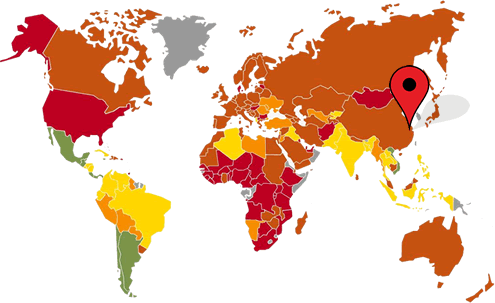
 About Me and My Work:
About Me and My Work:

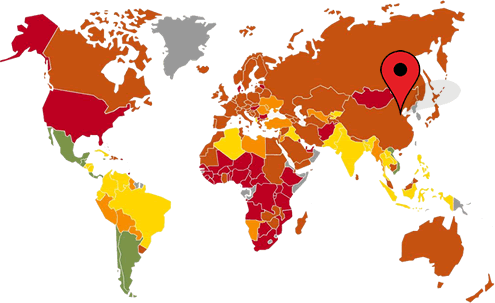
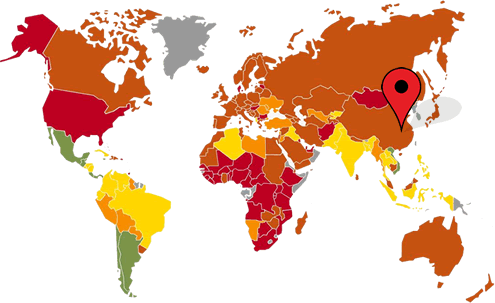
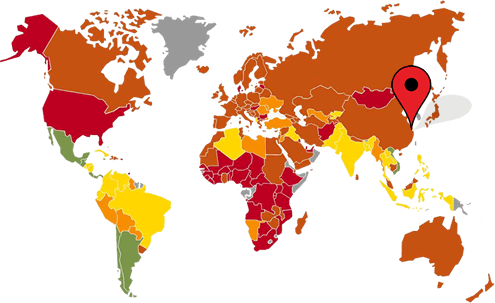
 My Name: Crissy Swartz
My Name: Crissy Swartz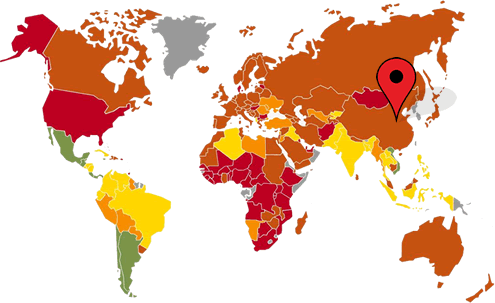
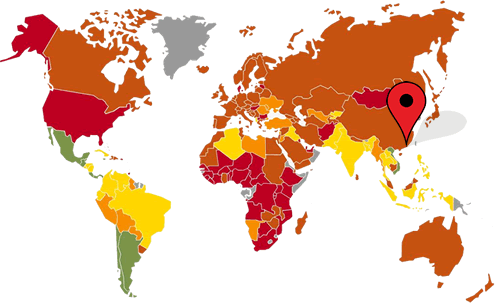
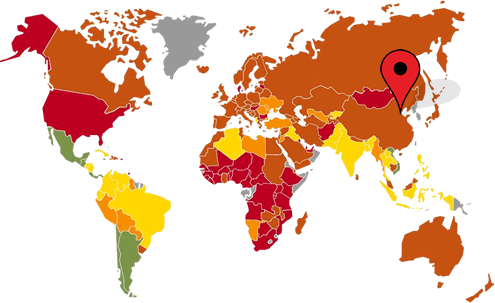

 My Name: Christina Goodno
My Name: Christina Goodno